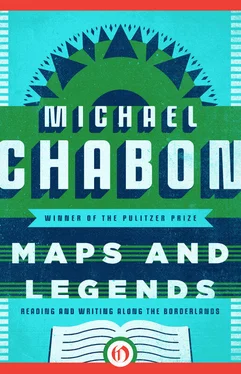Manifestly there is no reason to carry on, fire or not, through this “scabland,” which McCarthy portrays as so utterly defoliated and sterilized — the greatest corpse of all — that the idea of hope itself comes to seem like a kind of doom. The boy’s mother arrived early at this conclusion, killing herself when he was still a toddler. The impossibility of ever finding a home — literally, a place to live — is dramatized and proved by McCarthy in a poignant passage in which the travelers discover a miraculous backyard fallout shelter, intact, untouched, built by some unknown survivalist — and here is McCarthy’s humor at absolute zero — who failed to survive. Here they find warmth, light, enough provisions to keep them healthy and fed for a very long time. Yet they cannot stay; the shelter has been built to withstand fallout and fire, but it is not secure against the depredations of men. It’s too exposed, too easily uncovered, and after a few precious days of self-indulgence the travelers are obliged once again to move on.
In this impossible land the mother’s choice is clearly the only sane one, and nothing that occurs in the course of the novel up to the death of the father argues against the suicide that, contemplating his gun and his pair of bullets (eventually reduced to one), he repeatedly ponders. And yet in the end he and his author can’t bring themselves to pull the trigger. McCarthy is ensnared and his hell undone by the paradox that lies at the heart of every story of apocalypse. The only true account of the world after a disaster as nearly complete and as searing as the one McCarthy proposes, drawing heavily on the “nuclear winter” scenario first proposed by Carl Sagan and others, would be a book of blank pages, white as ash. But to annihilate the world in prose one must simultaneously write it into being. Thus even an act of stylistic denial as extreme as McCarthy’s here — the densely foliated sentences of Suttree and Blood Meridian, teeming with allusion and inhabited by exotic nouns and rare adjectives, are burned away; the chapters and scenes broken down into fragments and rubble — remains, in spite of itself, an affirmation. The paradox of language undoing the death it deals animates every passage of the novel, as in this typical description:
The country went from pine to liveoak and pine. Magnolias. Trees as dead as any. He picked up one of the heavy leaves and crushed it in his hand to powder and let the powder sift through his fingers.
Powder, dead; sure. But those words “liveoak,” “pine,” the somehow onomatopoeic splendor of “magnolia,” still flower greenly in the mind before McCarthy crushes them, and that leaf, which, if ash, must weigh very little, still lies heavy against the father’s hand.
The paradox in every part and sentence of the post-apocalyptic narrative — evoking even as it denies — is repeated as if fractally by The Road as a whole. The son has wearied of his father’s stories of the past, of deeds of heroism and goodness, of the world that no longer exists—“Those stories are not true,” he complains — but he has none of his own to offer. He leads an all but storyless existence in which meaning, motivation, and resolution have no place and nothing to do. And yet of course the only way McCarthy has of laying this tragic state before us is through storytelling, through craft and incident and a layered, tightly constructed narrative that partakes of the epic virtue it attempts to abnegate.
This paradox, like a brutal syllogism, leads McCarthy, almost, one senses, in spite of himself, to conclude The Road on a note of possible redemption that while moving and reassuring is prepared for neither by one’s reading of his prior work nor, perhaps, by the novel itself. In order to destroy the world, it becomes necessary to save it.
3.
All the elements of a science-fiction novel of the post-apocalypse are present or at least hinted at, then, in The Road: the urgent naturalism of McCarthy’s description of torched woodland, desiccated human remains, decaying structures, human and natural violence; the ambivalence toward technology embodied in the destructive-redemptive role of fire; the faint inventive echoes of works like Roger Zelazny’s Damnation Alley and the Mad Max movies in McCarthy’s “bloodcults,” roving gangs of tattooed barbarian cannibals driven by lust and hunger and surviving bits of diesel-powered machinery; and the strong invitation to pardon the exercise as a fable extended by the namelessness of characters and locales, by the vague nature of the disaster that has befallen the world, by the presence of at least one semi-allegorical character, and the usual, inevitable (in McCarthy’s work generally and the genre as a whole) speculation on the presence or absence of God. There are bits of satire of a very dark order in the hints that religious extremism caused this holocaust, and in the relentless way McCarthy deprives the foolish reader of the reassurances — a few precious surviving books, a luxuriant return of wildlife, a sense of savage freedom, or a necessary cleansing of the old corrupt world — of the strange comfort that post-apocalyptic stories characteristically provide.
The Road is most profitably read, however, neither as parable nor as science fiction, and fundamentally it marks not a departure from but a return to McCarthy’s most brilliant genre work, combined in a manner we have not seen since Blood Meridian: adventure and Gothic horror. That book (also a western, of course, like its three successors) is usually viewed not only as McCarthy’s greatest — a view I passionately share — but as representing a kind of fulcrum, a borderland between the early quartet of Tennessee novels written in the 1960s and 70s ( The Orchard Keeper, Outer Dark, Child of God, and Suttree ), which left McCarthy in obscurity, and the Border Trilogy ( All the Pretty Horses, The Crossing, and Cities of the Plain ), which brought him fame. In Blood Meridian lushness of prose counterbalances aridity of setting; digression and indirection have not yet ceded the narrative to the dictates of the trilogy’s archetypal western plots; and the Gothic impulse vies fiercely with the call to adventure. Setting aside the halfhearted No Country for Old Men, as charitably even the lover of McCarthy must, The Road seems to work its way back to the rich storytelling borderland of horror and the epic.
It is the adventure story in both its modern and epic forms that structures the narrative. There are strong echoes of the Jack London — style adventure, down to this novel’s thematic emphasis on the imperative to build a fire, in the father’s inherent resourcefulness, in his handiness with tools and guns, his foresight and punctilio, his resolve — you can only call it pluck — in the face of overwhelming natural odds, savage tribesmen, and the despair of solitude. Of course the underlying model for this modern kind of adventure story is Robinson Crusoe; and post-apocalyptic tales of lone survivors, such as George R. Stewart’s classic Earth Abides, have long played fruitfully with the pattern of Defoe’s novel, depicting as heroic if problematic a lone attempt to impose a bourgeois social order on an irrational empty wilderness after the Bomb or virus strikes.
The Road can also be read as an older form of adventure story that became discredited after the advent of Robinson Crusoe, that orderly, bourgeois, house-proud, and anxious hero, but that has haunted the work of McCarthy for years: the epic. Like the earlier duo of John Grady Cole and Billy Parham, the two young ranchers in the Border Trilogy novels, The Road’s father and son — the latter’s blond head evoked through conscious Grail imagery as a “golden chalice, good to house a god”—are bound up in a quest narrative, walking (by necessity, horses having become extinct) to find not revenge or justice or love as in those other books but a healing land of warmth and sunlight. There is no such place, we fear, and so, as in Blood Meridian, the quest here feels random, empty at its core; but the attitudes toward it of the characters and of the reader are altogether different. Though they and we fear it must end in tragedy and failure, we are rooting for them, pulling for them, from the first — and so, we suspect, is the author.
Читать дальше
Конец ознакомительного отрывка
Купить книгу












